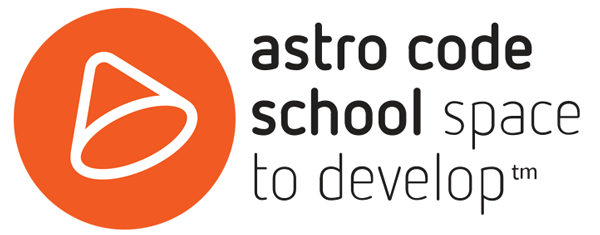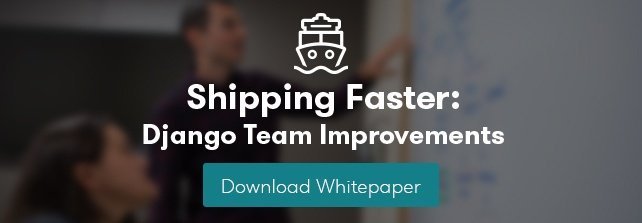
Our Astro Code School is now officially accepting applications to its twelve-week Python & Django Web Development class for intermediate programmers! To kick off Astro’s opening, we asked Caktus’ CTO and co-founder Colin Copeland, who recently won a 2015 Triangle Business Journal 40 Under 40 Leadership Award, and Astro’s Director Brian Russell to reflect on the development of Astro as well as the role they see the school playing in the Django community.
Why open the East Coast’s first Django and Python-focused code school?
Colin: Technology is an important part of economic growth in the Triangle area and we wanted to make sure those opportunities reached as many residents as possible. We saw that there were no East Coast formal adult training programs for Django or Python, our specialities. We have experience in this area, having hosted successful Django boot camps and private corporate trainings. Opening a code school was a way to consolidate the training side of Caktus’ business while also giving back to the Triangle-area community by creating a training center to help those looking to learn new skills.
Brian: Ultimately, Caktus noticed a need for developers and the lack of a central place to train them. The web framework Django is written in Python and Python is a great language for beginning coders. Python is the top learning language for the nation’s best universities.Those are the skills prominent here at Caktus. It was an opportunity to train more people and prepare them for the growing technology industry at firms like Caktus.
How has demand for Django-based web applications changed since Caktus first began?
Colin: It has increased significantly. We only do Django development now, we weren’t specialized in that way when we first started. The sheer number of inbound sales requests is much higher than before. More people are aware of Django, conferences are bigger. Most significantly, it has an ever-growing reputation as a more professional, stable, and maintainable framework than other languages.
How does Astro, then, fit into this growth timeline?
Colin: It’s a pretty simple supply and demand ratio. Astro comes out of a desire to add more developers to the field and meet a growing demand for Django coders. The Bureau of Labor Statistics projects a 20% growth in demand for web developers by 2020. It is not practical to wait for today’s college, high school, or even middle-school students to become developers. Many great software developers are adults coming from second or third careers. Our staff certainly reflects this truth. Astro provides one means for talented adults to move into the growing technology industry.
Where do you see Astro fitting in to the local Python and Django community? For instance, how do you envision Astro’s relationship to some of the groups Caktus maintains a strong relationship with, such as Girl Develop It or TriPython?
Colin: Astro’s goals clearly align with those of Girl Develop It in terms of training and support. And the space will be a great place to host events for local groups and classes.
Brian: Yeah, I see it as a very natural fit. We hope to help those organizations by sponsoring meetups, hosting events, and providing free community programs and workshops. And there is the obvious hope that folks from those groups will enroll as students at Astro. I think it’s also important to note that Chris Calloway, one of the lead organizers for TriPython, is a member of the Astro advisory committee. There is a natural friendship with that community.
How do you hope Astro will change and add to Durham’s existing technical community?
Brian: In general there are a lot students with training from Astro who will be able to bring their skills to local businesses, schools, non-profits—all sorts of organizations. For me, computer programming is like reading, writing, and arithmetic: it should be a part of core curriculum for students these days. It helps people improve their own net worth and contribute to the local economy. Astro is all about workforce development and improving technical literacy: two things that help entrepreneurs and entrepreneurial enterprises.
What are some of the main goals for Astro in its first year?
Brian: I want to help people find better, higher paying jobs by obtaining skills that are usable in the current economy through our 12-week classes. I’m personally interested in social economic justice and one way to achieve that is by being highly skilled. Training helps people better themselves no matter what kind of education it is. In the 21st century, computer programming education is one of the most powerful tools for job preparedness and improvement.
Colin: I would love to follow alumni who make it through the classes and see how their skills help them in their careers.
A huge amount of work has gone into getting Astro licensed with the North Carolina Community College Board. A lot of code schools are not licensed. Why was this an important step for Astro?
Brian: Mainly because we wanted to demonstrate to potential students and the public at large that we’ve done our due diligence, that other groups and professionals have vetted us and qualified us as prepared to serve. Ultimately we are licensed in order to protect consumers. Not just licensed—we’re bonded, licensed, and insured. And this is an ongoing guarantee to our students. We will be audited annually for six years. I see it as a promise for continuous and ongoing protection, betterment, and improvement.
So, who would you describe as the ideal student for an Astro course?
Brian: A lot of students. Any. All different kinds. But, more specifically? I would recommend it to folks changing their career. Or people who graduated from high school, but for one reason or another are not able to go onto higher education. Astro classes will be excellent for job preparedness and training so anyone looking to market themselves in the current economy.
Additionally, anyone fine tuning their career after college or even after grad school. Coding and learning to code is an excellent way to earn money to pay for school without getting into debt. Astro is in no way a replacement for higher ed, but coding classes can augment a well-rounded education. Successful people have a diverse education. And learning to code enables people to align their toolkits for the modern job market.
To learn more about Astro, meet Colin and Brian in person, and celebrate the opening of Astro Code School, be sure to stop by the school’s Launch Party on Friday, May 1st from 6:00 to 9:00 pm. Registration is required.


